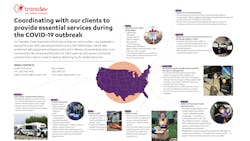The ability to adapt and be agile: We can’t stop now
The ability to adapt. To be agile. Traits that have become particularly relevant for the transportation industry since March 2020.
When the coronavirus outbreak became reality in the United States in March, transit agencies had to adapt quickly. Most states mandated “sheltering in place” and restricted mobility to essential trips. In many cities, transit agencies cut service in light of greatly reduced demand, making it difficult for essential workers, paratransit users and others to get where they needed to go.
On the other hand, many drivers wanted to work – but there was little to no service to operate. It quickly became clear in the many conversations happening across the country between transit agencies and key community services that there were many people who needed help during this pandemic. These community services needed transportation support in order to be able to help people.
Our industry stepped up to fill the void and address the communities’ needs. Initially, a variety of new service models were created and replicated in multiple cities. For example, many agencies mobilized to deliver meals, groceries from food banks and a variety of essential items to seniors, families in need, homebound paratransit passengers and more. Many established partnerships with Meals on Wheels and the United Way to help fulfill this new model.
In addition to delivery-type services, other opportunities were realized. Some agencies expanded to transport healthcare workers to their essential jobs – this included not only doctors and nurses, but also hospital cafeteria workers, imaging techs, janitorial and pharmacy workers and housekeeping employees. Some transported passengers to medical appointments, pharmacies, grocery shopping and even to COVID-19 testing sites.
Transit agencies were thus able to continue serving passengers but did so in new ways that were much needed and appreciated. An industry, not typically known for its ability to change quickly, showed tremendous agility and adaptability by using its assets and experience to provide highly relevant services, each customized to meet local needs.
“At Transdev, we worked with clients and community services organizations in many cities to fill the mobility void. We offered them many different types of delivery and transportation services. We were acutely aware of the need for life sustaining services beyond public transportation in our communities and we knew we wanted to do our part to help,” said Dick Alexander, CEO, Transdev U.S.
“We are very happy to be able to help our community in this time of need. All our community partners are really stepping up to make things happen. We are able to offer a variety of support throughout the region. Everyone’s creativity and energy to help those in need has been amazing,” said Rashida Kamara, manager of Accessible Services for County Connection in Concord, Calif.
“These new partnerships have created opportunities to work together through this crisis and implement solutions that directly help the community we serve,” said Rick Ramacier, general manager of County Connection.
“The services we provided in many cities, with the support of our transit agency clients, yielded positive results for the community and for those deeply affected by this unprecedented crisis,” added Alexander. “Over the past few months, our industry has proven that our people are truly #HeroesMovingHeroes. The dedication and sense of service our employees have shown throughout this crisis has been admirable. I have never been more proud to be part of this industry.”
The impressive results achieved clearly show the role of public transportation as a vital and critical element of our society. The need to adapt and the willingness to be agile will need to continue as we move through this current crisis and beyond. As we enter a new reality, the challenging circumstances we will likely face will require it.
---------------------------

W.C. Pihl | Senior Vice President of Business Development, Transdev N.A.
As an executive leader with more than 25 years of experience in operations and business development, W.C. leads Transdev’s business development efforts across the United States. He works closely with the company's clients to identify and establish solutions to transportation challenges in order to provide a positive impact on the passengers Transdev serves. Named to Mass Transit Magazine’s 40 Under 40 list in 2011, W.C. has been an active presence in the transportation industry for many years. From beginning his career as a bus operator in college, to holding positions from General Manager, Corporate Director of Safety and Training, Executive Vice President of Business Development, to his current role, W.C. has vast knowledge and exceptional understanding of transportation operations and client support at all levels.




